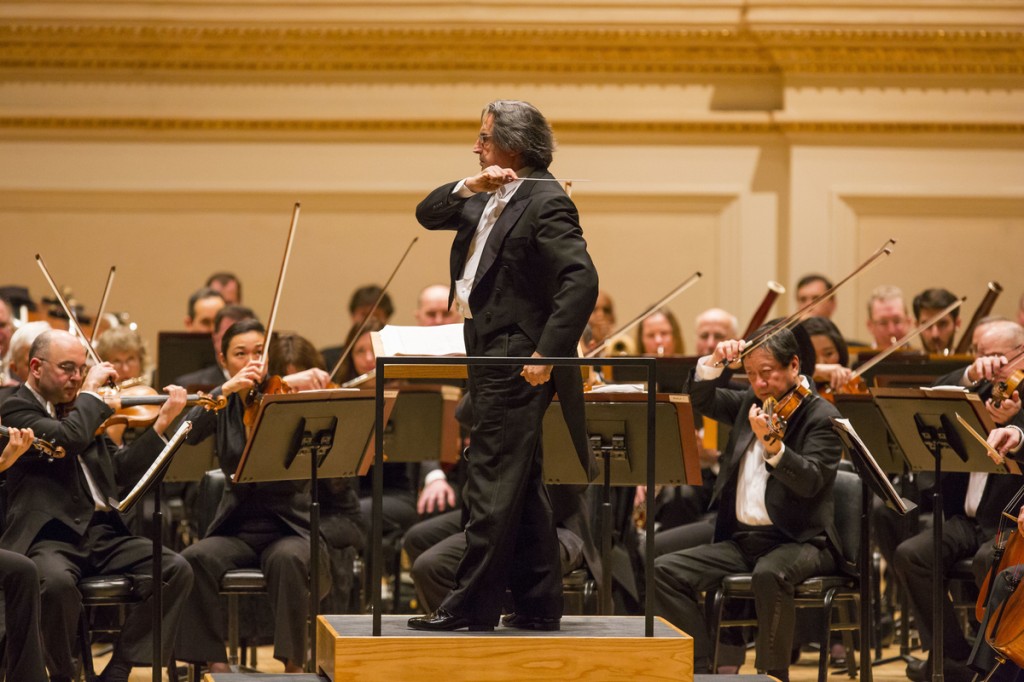Muti, Chicago Symphony open Carnegie stand with playing of brilliant detachment

Riccardo Muti conducted the Chicago Symphony Orchestra in music of Scriabin, Debussy and Mendelssohn Friday night at Carnegie Hall. Photo: Todd Rosenberg
The Chicago Symphony Orchestra and conductor Riccardo Muti mounted the stage at Carnegie Hall last night, coinciding with the arrival of bitterly cold winds in New York City. As foolish as it sounds to attribute that as the cause, one is left puzzled as to just why such a prominent visiting orchestra would play a road-ready program with such complete indifference.
The puzzle was compounded by the program itself—Mendelssohn’s concert overture Calm Sea and Prosperous Voyage, La Mer, and Scriabin’s Symphony No. 3, “The Divine Poem”—a set of pieces assembled to show off the orchestra’s colors, lyricism, and expressive depths.
Scriabin’s symphony was highly anticipated. His name is far more familiar than his music, which is rarely heard in concert, and Muti has more experience with this repertoire than probably any other living conductor, having produced the best recorded collection of Scriabin with the Philadelphia Orchestra.
The Russian composer’s sense of form in “The Divine Poem” is at the unstable end of the late romantic era in classical music, but the means that he uses to express his mystical narrative are in the mainstream of 19th-century music; waltzes, lilting melodies, and cadences that make the strange change from major to minor.
His music has two challenges, the first is the capacity to be sympathetic to his mystical visions (in his words, “the evolution of the human spirit . . . celebrating its unity with the universe”), the second is to be able to hear that in language that doesn’t quite have the vocabulary that Scriabin needed.
Scriabin needs not just a firm hand but a full-throated advocate, someone who, at least in the moment, is the composer’s acolyte. Yet Muti treated the dramatic content as just another set of changes in orchestration and volume.
Perhaps familiarity has bred overconfidence, or the assumption that everyone will get what it is going on. But playing Scriabin as absolute music produces a weird exercise in self-indulgent stream of consciousness.
But then it was a weird concert all the way around. The Chicago Symphony’s playing was, technically, as fine as possible. They had a satisfyingly weighty sound that felt like what it is to hold a plumb bob in one’s hand. Their dynamic range–Muti kept things just on the quiet side for the most part–was impressive, and the violins played a spectacularly long, evenly spaced crescendo in the Mendelssohn overture.
Orchestral balances were incredible. Not only was every section and instrument clear, but so was the mesh of the inner workings of the music, especially in La Mer. The blend of woodwind colors in Calm Sea was like hearing the sound of a jewel.
The symphony’s brass section has been famous for decades, in part because of the prominence Georg Solti gave them. They’re even better now, able to modulate from bright to sepia tones, hitting the exact balance between fusing their sound and maintaining clear, individual voices—the low brass played with enough presence to rattle the floor in Scriabin’s symphony without ever overwhelming the rest of the orchestra.
There was nothing but beautiful playing—and yet not a hint of feeling. The orchestra seemed happy with the sound they were making, enjoying the experience of it, and had nothing to say about the music—not only the Scriabin, which almost screams out to say something, but La Mer, one of the greatest and most important orchestral works in classical music. It seemed no more than pleasant in this performance.
Two expressive elements were consistently lacking; changes in tempo and a sense of musicality in the phrasing. Both work together to express something about music. What that thing is needn’t be anything more than the musicians’ pleasure in hearing a line end just so, or the opinion that the music that has come before leads to the current moment.
Instead, the playing was oddly and inappropriately egalitarian. Muti and the orchestra seemed engaged at the level of a dress rehearsal, professional but with no spark of live energy, indifferent to the presence of an audience, and lacking any particular reason to play the pieces on the concert program, except for the fact that the music just happened to be in front of them.
The Chicago Symphony Orchestra plays music of Brahms and Schumann 8 p.m. Saturday and Scriabin and Prokofiev 2 p.m. Sunday. carnegiehall.org






Posted Jan 31, 2015 at 3:02 pm by Roger Conner
What was the audience’s reaction? Was it as negative as your conclusion suggests?
Posted Jan 31, 2015 at 6:04 pm by Avi
Detachment? Riccardo Muti? This is a very nice joke. Well, visually, he is not going crazy, as the young generation inclines to do. But hey, he knows music better than anyone else, so no need for that, and his authority is somewhat natural, certainly not to gain anything with the dancing on the podium or the traumatic openings of the mouth… But detachment, in point of fact, and as concerning the great performance of yesstraday, I think that there is nothing further from the true. Sorry to say so. Really. But cannot agree less with you. Maybe it is the expectation that in New York, an extra something must be? Well, not really. With respect, Avi
Posted Feb 03, 2015 at 3:48 pm by Bob Callahan
I would describe the Carnegie audiences for the CSO concerts as rapt during each performance, and roaring at the end.
Posted Feb 04, 2015 at 9:09 am by Martin
Avi, were you at the concert? I was, and this article describes my feeling exactly: The most beautiful orchestral sound I was given to hear (I also guess the venue played an important role), and no emotion whatsoever.
Roger, the audience’s reaction was warm, with a lot of people standing at the end of the concert.